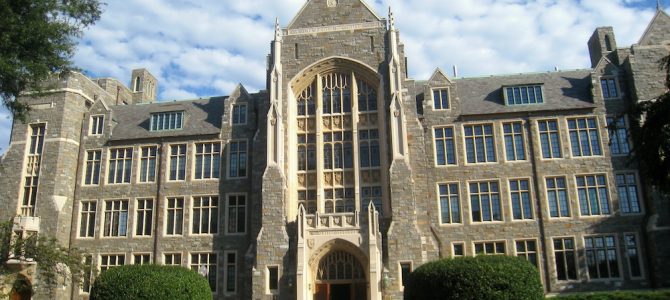Georgetown University recently announced it would grant special admissions privileges to descendants of 272 African-American slaves the school helped to sell in 1838. According to Georgetown President John DeGioia, descendants of the slaves will benefit from the same admissions advantages given to alumni and their family members, as well as others in the “Georgetown community.”
Georgetown isn’t the first university to attempt to atone for its slavery-related sins, but it is the first to offer an admissions advantage as a way to make up for past injustices.
There is no question slavery was abhorrent and that any institution involved in the practice ought to work to ensure liberty is given to all and that truly racist, sexist, and bigoted practices are eliminated from its admissions processes.
But in this effort to compensate for their racist past, Georgetown and other elite colleges—many of which offer admissions preferences to particular minority groups—are engaging in an entirely new form of bigotry against applicants who don’t happen to have the “right” racial composition. America’s most prestigious colleges are, in fact, applying unquestionably racist admissions policies under the guise of “diversity,” building an entirely new form of institutional bias that will need to be apologized for in the future.
Colleges Decide Which Racial Groups Deserve the Most Support
The proof of racial favoritism in higher education is overwhelming. In 2012, Harvard University doctoral student Rachel Rubin conducted a survey of admissions practices used by the nation’s 63 most competitive colleges. She found that of the 21 percent that acknowledged using non-academic admissions characteristics in their first stage of decisions, 42 percent said race was the most important variable—tied for first with “exceptional talent.” Rubin also concluded certain “pools” of applicants, including “non-white U.S. citizens,” received preference at many of the colleges surveyed.
Preferences given to minority students extend to many graduate programs as well. Data provided by the Association of American Medical Colleges reveal African-American and Hispanic medical school applicants have a distinct advantage over others. Based on aggregated admissions data from 2013 to 2016, 49 percent of African-American applicants with a total MCAT standardized test score between 27 and 29 and an undergraduate GPA between 2.80 and 2.99 were accepted to U.S. medical schools. Only 12 percent of white applicants and less than 9 percent of Asian applicants with the same profile were accepted over that period.
Proponents of these admissions practices argue that favoring “underrepresented” groups helps right injustices of the past. But by picking which injustices merit admissions advantages, colleges not only create more injustice—they discriminate against other groups, some of which are also disadvantaged.
Many racial groups, for instance, have been and continue to be illogically classified as “white” or “Asian.” A U.S. citizen of Afghani decent might be classified as either white or Asian, for example, but certainly not as African-American or Hispanic.
Colleges Assume Certain Racial Groups Are More Disadvantaged Than Others
Then there’s the incredibly racist assumption colleges often make that African-American and Hispanic applicants are more “disadvantaged” than others outside those categories. Hmong-Americans—a group that came to America in the 1970s from China, Laos, Thailand, and Vietnam to escape war—face poverty rates that rival any other racial group in the United States. But they are often placed in the “Asian” admissions category, which, according to the data, actually hurts their chances more than white applicants.
Based on the current system, the African-American child of a wealthy Ivy League-educated doctor would have a much better chance of gaining an admissions advantage than an impoverished Hmong-American from Detroit. There is nothing “fair” about that. By its very nature, choosing to favor certain racial groups in admissions is unjust, especially when colleges decide which groups are worthy and which are not.
Virtually every single race and religion have experienced discrimination at one time or another in American history. The Chinese built much of the railroad system in the West under conditions that could fairly be classified as a form of slavery. Early Irish immigrants often served as indentured servants to wealthy British colonists. Women, including all white women, didn’t even have the right to vote until 1920. Germans, Scandinavians, and virtually every other group to ever come to America have been disadvantaged at one time or another. And who wants to argue the grandchildren of Holocaust survivors are less deserving of an admissions advantage than other racial groups that have experienced hardships?
Instead of giving preference to students based on poorly contrived, politically motivated factors, America’s colleges should adopt the (radical) practice of judging people purely on academic and artistic achievement. Any other system, however well packaged, is nothing less than veiled racism and has no place in a nation striving to foster equality for all.









